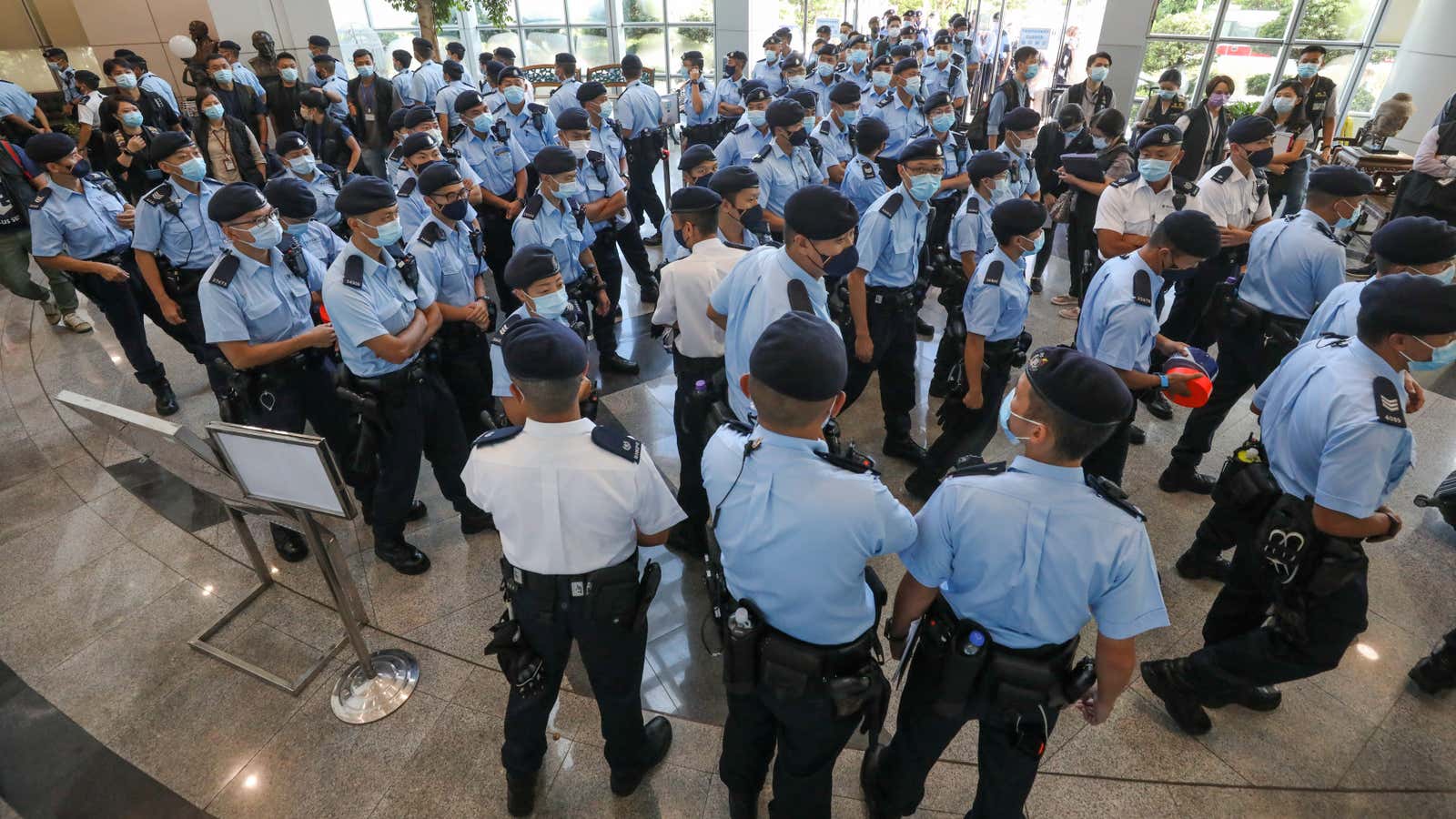On Thursday morning, hundreds of police officers descended on the newsroom of Hong Kong pro-democracy publisher Apple Daily. It was the second raid on the publication in less than a year.
Police searched the newsroom, seized three dozen computers, and arrested three editors, including the paper’s editor-in-chief Ryan Law, as well as two executives of Next Digital, the paper’s parent company. Employees were barred from accessing their desks, according to Apple Daily, with a senior police official calling the newsroom a “crime scene.” Hong Kong’s secretary for security told reporters the paper was raided over coverage that called for foreign countries to impose sanctions on China, and said that this amounted to conspiracy to collude with foreign forces, a crime under Hong Kong’s year-old national security law. It’s unclear if he was referring to articles or commentary.
The paper’s accounts were also frozen.
The arrests created consternation in Hong Kong’s press corps, already alarmed about the impact of the national security law on a city long famed as a press hub.
To date, highly visible actions under the national security law have focused on political activists. Most opposition voices are now under trial, while others have fled. But the language of the national security law always made clear that the press was in Beijing’s sights.
Since the first raid on Apple Daily last August, founder Jimmy Lai has been in and out of court on a series of charges related to unlawful assembly and fraud. In May, he was sentenced to 14 months in prison on the assembly charge; Lai also faces a national security trial for collusion. Investigative journalist Bao Choy was prosecuted in connection with her accessing of a vehicle registration database while reporting on police lapses during a 2019 thug attack at a subway station (that charge was not brought under the national security law). The government also reviewed the coverage of public broadcaster RTHK, well-regarded for its independent reporting, changed its management, suspended programs, and has begun deleting coverage that no longer aligns with its new editorial direction.
Still, Thursday’s raid marks a major escalation. The arrest of editor in chief Law, who was taken into custody from his home at 7am this morning and escorted to Apple Daily’s offices in handcuffs, appears to be the first arrest of a working journalist under the national security law relating to editorial coverage. The mass seizure of computers carrying journalistic notes is also unprecedented.
After the raid, which some Apple Daily journalists live streamed, employees returned to the newsroom, working from mobile phones in some cases, as their computers had been seized. The paper put out an open letter vowing to press on:
…The law enforcement has labelled journalistic materials that were gathered openly as evidence of crime; while the regime has publicly called on journalists to keep a distance from fellow media workers, who are merely doing their jobs. Today’s Hong Kong feels unfamiliar and leaves us speechless. It feels as though we are powerless to stop the regime from exercising its power as it pleases.
Nevertheless, the staff of Apple Daily is standing firm. We will continue to persist as Hongkongers and live up to the expectations so that we have no regrets to our readers and the times we are in.
At a press conference, reporters asked Hong Kong’s secretary for security, John Lee, which Apple Daily articles were suspected of falling foul of the national security law, and whether it would also constitute a national security crime to repost them, for example. In response, Lee urged journalists not to see Apple Daily staffers as their press colleagues and to “distance” themselves.
“[We] need to differentiate what these suspects have done from normal journalistic work,” Lee said. “Normal journalistic work, of course, takes place freely and lawfully in Hong Kong, and I do not envisage any professional journalists would be conspiring to do any act to endanger national security. So the answer is simple—do your journalistic work as freely as you like in accordance with the law provided you do not conspire or have any intention to break the Hong Kong law and certainly not the Hong Kong National Security Law.”
